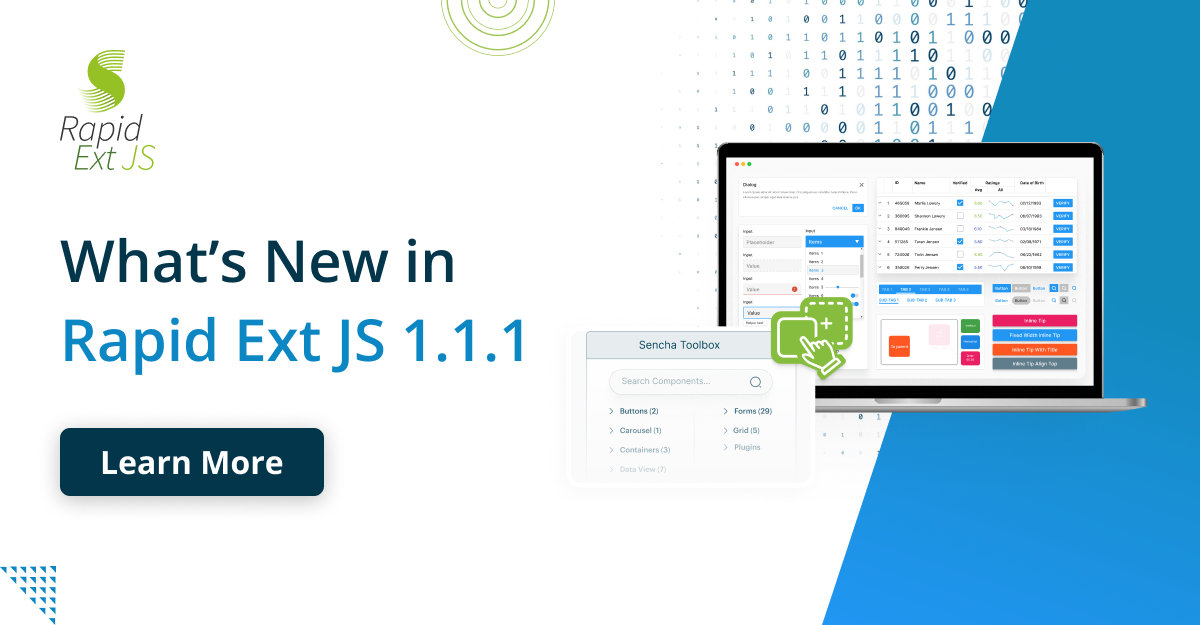Sencha Product Roadmap Themes
Last week, we announced the release of Sencha Ext JS framework 6.5.2 and Sencha Cmd 6.5.2. These releases include hundreds of minor improvements and bug fixes in both of the Ext JS modern and classic toolkits. We are currently working on developing Ext JS 6.5.3 that will include many customer requested bug fixes and improvements in the Modern toolkit.
Since Sencha became part of the IDERA family, we’ve received a number of customer and community requests to clarify product progressions and roadmap. We continue to welcome your requests for product enhancements on blogs, surveys, emails, roadshows, forums, customer calls, as well as product user testing. Many of you are also providing detailed feature requests using the Sencha Forum on Ext JS Feature requests.
Based on your feedback, we are building a comprehensive and detailed roadmap. We’ve shared some of the key roadmap themes below:
Bring Modern toolkit to parity compared to classic toolkit
Many Sencha customers are embracing the modern toolkit as a way of creating a single code base that serves multiple devices and platforms – from desktops, tablets to smartphones. Sencha’s modern toolkit supports creating performant applications with a responsive and adaptive user interface that looks great on all modern browsers. We have received great feedback about the Employee Directory application that we released a few months back with the Ext JS 6.5 release. However, there are certain features in classic toolkit that are not supported in modern toolkit, such as grid filtering and a locking grid. Many of you are requesting we bring component feature parity to modern toolkit along with additional enhancements of accessibility and localization support.
Support Modern Dev Toolchains
For most Sencha developers, Sencha Cmd provides a single cross-platform command line tool that helps with most development tasks – from creating starter apps to compiling and building complete applications. Over the last few years, we have seen rapid changes in modern JavaScript tooling. The NPM registry has become the largest software registry in the world with half a million packages of free and reusable code. Many of our customers are making use of these modular NPM packages to assemble new projects quickly. Along with NPM, many other tools such as webpack and babel are becoming common in the JavaScript community. Sencha already provides support for modern tooling with our ExtReact product, and we’ve heard the requests for similar support from our ExtJS customers.
Full Support for new JavaScript language specifications
ECMAScript 2015 or ES6 was the largest upgrade to JavaScript since its creation. Since ES6, there have been yearly updates to the ECMAScript specifications. This helps you develop applications with powerful new syntax for JavaScript classes and modules along with arrow functions, default parameters, spread operator, and more. Additionally, ExtJS 6.5.2 with Cmd 6.5.2 provide support for many ECMAScript 2017 features by making use of the updated Google closure compiler. We have heard the customer requests for full support of the latest ECMAScript standards with support for ES6 Class and ES6 Modules system.
Enhance Ext JS Tooling with updates to Architect and Themer
Sencha Architect continues to be a comprehensive visual builder that is used by many ExtJS developers. We have heard the customer requests to update Architect and remove its dependency on metadata information. Similarly, Themer is a comprehensive theming tool and ExtJS customers are requesting better integration between Themer and Architect to create a better, faster end-to-end development workflow.
Enhance ExtReact with support for new React framework versions
ExtReact is a relatively new product compared to ExtJS; it provides React developers with hundreds of ready to use powerful UI components from within the ExtJS framework. You can use tools such as Themer to theme apps built using ExtReact components. Our user testing from ExtReact trial users revealed that React developers are looking for an improved ExtReact trial experience, compatibility with latest React releases, and better adoption of React tooling.
Enhance Sencha Test to further improve QA team productivity
Sencha Test is a comprehensive testing tool used by Ext JS developers for creating unit tests, as well as QA engineers for creating functional automated tests. Sencha Test provides a set of Test APIs to target Ext JS components along with an event recorder and inspection capabilities. We currently have an early access version for Sencha Test 2.2 available for trial and feedback. Soon we will be releasing an update to the early access release that will address many enhancement requests from customers, and will include new features to improve the Inspection capability.
Next Steps: Take the Survey
We are thankful to you for providing generous product feedback that is used as a basis to create our product roadmap themes. We would like to invite you to continue to participate in the discussion so we can gain insight into your specific requirements and their criticality to your organization. Please complete the survey below to help us in collecting and organizing your feedback.
Take the Survey: https://www.surveymonkey.com/r/32C6DN3
**Note: All features are not committed until the GA version is released and delivered.

The Sencha team is excited to announce the latest Sencha Rapid Ext JS 1.1.1 release…

React is perhaps the most widely used web app-building framework right now. Many developers also…

React’s everywhere. If you’ve built a web app lately, chances are you’ve already used it.…









